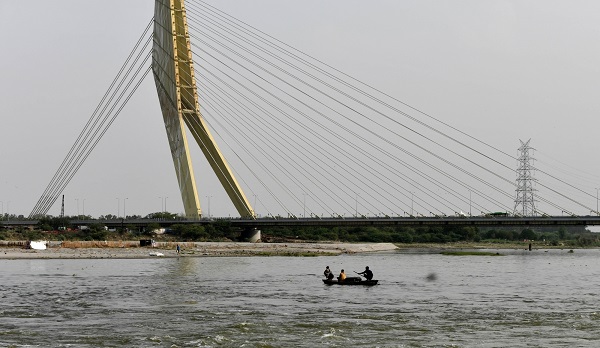New Delhi, (Samajweekly) The Delhi government has informed the Supreme Court that the presence of pollutants in the Yamuna between Palla and Wazirabad is principally attributable to the discharge of untreated pollutants into the river upstream in Haryana.
In a rejoinder affidavit in the top court in response to the reply of Haryana and its Department of Irrigation and Water Resources, the Delhi government said: “It is further submitted that there are no entry points for pollutants into the River Yamuna between Palla and Wazirabad in the NCT of Delhi.”
It said the continued actions/inaction of the Haryana government and its Water Resources Department have led to large scale reductions of up to 30 per cent in water supply in many areas supplied by the Wazirabad, Chandrawal and Okhla Water Treatment Plants, and has a direct and potentially devastating impact on the right of residents of the NCT of Delhi to clean and adequate drinking water.
“Even as of 9 a.m. on April 11, 2021, the ammonia level in the River Yamuna at the point it enters the Wazirabad reservoir is 4.4 ppm, which is much higher than the ammonia level that the plants of the Petitioner Board can process for purification,” Delhi said in the affidavit.
It claimed this has resulted in the Wazirabad water treatment plant functioning at 71 per cent of its capacity, the Chandrawal water treatment plant at 84 per cent, and the Okhla water treatment plant at 86 percent of its capacity as on April 11, causing large scale water shortage.
On March 26, a bench headed by Chief Justice S.A. Bobde, had directed the Haryana government and others to continue with status quo on supply of Yamuna water to Delhi. The bench had clarified the water supply to the national capital which is facing a shortage should not be reduced.
The Delhi government, which moved the top court in January this year through the Delhi Jal Board (DJB), had sought directions to Haryana to cease the discharge of untreated pollutants into the Yamuna and also release sufficient water to the national capital.
The rejoinder affidavit, filed through DJB’s Chief Engineer M.K. Hans, contended “the entire reply is an exercise in obfuscation, wherein the Respondents No 1 and 2 (Haryana and its department concerned) have effectively sought to assert a ‘right to pollute’ the Yamuna, taking advantage of their geographical location as an upper riparian state”.
The affidavit said the Delhi government moved the top court to avert a water crisis, as it also noted that the SC, on multiple occasions, held that the “right to clean and adequate drinking water forms part of the right to life under Article 21 of the Constitution”.
Download and Install ‘Samaj Weekly’ App
https://play.google.com/store/apps/details?id=in.yourhost.samajweekly










